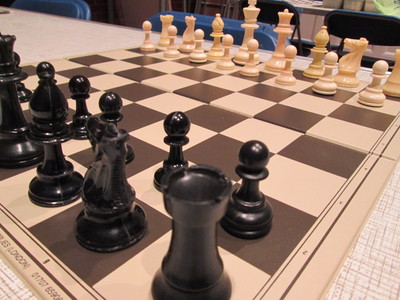A brief history of Cambridge City Chess Club, from the 1830s to the 1980s
by Richard Newman
The earliest mention that I have been able to find with respect to organised chess is the Cambridge Town Chess Club (Cambridge was a Town until declared a City in 1951), which was in existence by 1835 and in the 1850s was meeting regularly in the Lion Hotel, Petty Cury (since demolished).
From the Cambridge News of 1934:A Cambridge chess club was first mentioned in 1835 and in 1837-38 it was sufficiently organised to play a match of two games by correspondence with Nottingham's 'Town and Gown' club. But an experimenting holding a Chess Congress in Cambridge in 1880 was a complete fiasco - the British Chess Association had selected Cambridge as the meeting place, but little support was forthcoming from the University Chess Club.
This club disappeared after 1860 and was reformed in 1896 together with the Cambridgeshire Chess Association. The next mention of the club was in the 1960s when it used to meet in the Kite district of Cambridge (information from Richard Donaghay).
When I joined the City Club in 1974, it met at the University Graduate Centre and the President was Mr. Coulson (a local pharmacist). The club numbered around thirty to forty and played in the Cambridge and District League which included some of the Colleges. The club had some eminent University players, including Bill Hartston and Jonathan Mestel who were both elected Honorary Life Members.
When Mr. Coulson retired the next President was Mr. R.F.Holmes (a Fellow of Darwin College).
In 1981 Mr. Holmes retired for reasons of ill health and I took over. During my time as President I invited Jon Mestel to give one of the simuls and all he required was a pint. Erik Teichman (FIDE master) also joined the club, and we had Sverre Aarseth who was a strong correspondence player (he also climbed K2!).
When Mr. Victor Raines - a strong player who was a college gardener - died, he left £1,000 pounds to the Club and £1,000 pounds to the Cambs. Chess Association. This was a good deal of money and was much appreciated, although because we only paid for a Christmas box for the porters for use of the Graduate Centre our coffers were full. We bought a cup which is still played for. Harry Scarlett was another local who played at above grade 200 and had worked at Pye (a local electronics firm). The East Anglian Chess Union was formed and the annual telephone match with Oxford City was cancelled!
I had a sabbatical year in Heidelberg in 1985 when Colin Edwards took over the Presidency. From Colin the next President was Max and then Philip Fallon, followed by Patrick Ribbands, John Daugman and now (2024) Philip Fallon.
